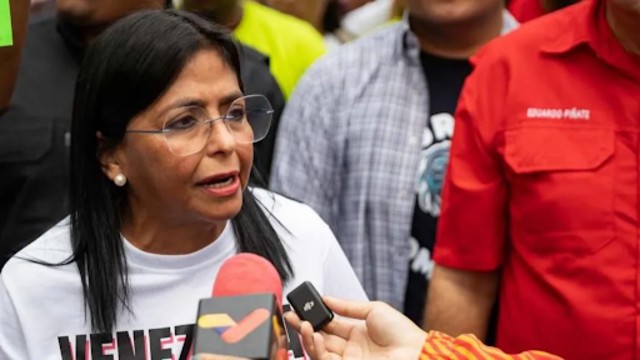
FILE - Republican presidential candidate former President Donald Trump listens as Sen. Tim Scott, R-S.C., speaks at a primary election night party at the South Carolina State Fairgrounds in Columbia, S.C., Saturday, Feb. 24, 2024. A top ally of former President Donald Trump — and a potential running mate — is launching a new effort to win over Black and other nonwhite working class voters he argues could be the deciding factor in November's elections. South Carolina Sen. Tim Scott, the only Black Republican in the Senate, will lead a $14 million campaign targeting minority voters in seven key swing states. (AP Photo/Andrew Harnik, File)
WASHINGTON (AP) — A key supporter and potential running mate of former President Donald Trump is launching a fresh initiative to appeal to Black and other nonwhite working-class voters, whom he believes could sway the outcome of the upcoming elections in November.
Senator Tim Scott from South Carolina, the sole Black Republican in the Senate, is spearheading a $14 million initiative aimed at minority voters in seven crucial swing states.
Scott's effort comes as Trump's campaign intensifies its outreach to Hispanic and Black voters, particularly Black men, in anticipation of a rematch against President Joe Biden. It also provides Scott, among several Republicans being considered for vice president by Trump's campaign, with another platform to showcase his allegiance — and usefulness — to the presumed GOP nominee.
Scott contends that with Trump leading the charge, Republicans have a distinct chance to chip away at the Democratic Party's long-standing dominance with minority voters. Surveys indicate that many Black and other nonwhite adults are discontent with Biden's performance, though Trump may face challenges in winning them over due to his own unpopularity among these groups.
"There's no denying that African American men are ripe for a political shift," Scott stated as he briefed reporters on the initiative in Washington this week.
The new campaign will be overseen by Scott’s Great Opportunity PAC, which was established after he suspended his presidential campaign last year. Aides indicate that the group will focus on engaging voters in Georgia, North Carolina, Arizona, Wisconsin, Michigan, Nevada, and Pennsylvania.
The campaign strategy will encompass canvassing, digital advertising, direct mail, events, and appearances by Scott and other elected officials in minority communities that Republicans have often neglected.
Though separate from Trump’s campaign, aides reveal that Scott recently met with Republican National Committee Chairman Michael Whatley and Co-Chair Lara Trump to discuss his plans.
"We will strive to earn the votes of Black and brown voters and in doing so, help Donald J. Trump secure the Presidency and Republicans regain control of the House and Senate," stated a memo from Jennifer DeCasper, who managed Scott’s 2024 campaign.
In recent weeks, Trump has held various events targeting these groups, including a rally in New York's South Bronx and a dinner with students and alumni from historically Black colleges and universities at his Mar-a-Lago club in Florida.
Simultaneously, national Democrats are making significant investments to counter Trump's attempts to attract a core constituency. Biden and Vice President Kamala Harris recently launched a Black voter outreach campaign, emphasizing their efforts to increase funding for these schools, forgive federal student loan debt, and pardon individuals convicted for minor marijuana possession.
Responding to Scott's initiative, Sarafina Chitika, a senior spokesperson for Biden-Harris, accused Trump of showing indifference toward Black people or their communities, citing examples such as Trump's call for the death penalty for the "Central Park Five."
Scott's group believes that a significant realignment is underway, highlighting Trump's success in winning over large segments of white working-class voters who traditionally supported Democrats. They see signs of a broader shift where more nonwhite working-class voters could gravitate towards Trump.
Even a small shift in support from minority voters could be pivotal in what is expected to be a closely contested election decided in a handful of battleground states.
Though many Black and Hispanic adults express dissatisfaction with Biden’s presidency, surveys indicate that only a fraction of them have a favorable view of Trump, which may hinder his efforts to capitalize on Biden’s shortcomings.
Nonetheless, Scott asserts that Trump's policies were beneficial for Black Americans, citing initiatives like bipartisan criminal justice reform and funding for historically Black colleges and universities. Voters, he contends, are dissatisfied and seeking better economic opportunities, safer neighborhoods, and improved education.
"We’ve seen promising signs of change," Scott remarked. "With effective communication, we have a strong chance to influence this election unlike previous ones.”
This could involve Scott joining Trump's ticket, according to allies. As the Republican National Convention approaches, many contenders are vying for favor, making appearances with Trump during his ongoing criminal hush money trial.
Scott has frequently appeared with Trump at fundraisers and on television, earning praise from Trump for his effective advocacy.
Pressed on Trump's legal issues, Scott suggests that they could bolster support among Black Americans, particularly Black men, who are "fed up" with what they perceive as a "two-tiered justice system."
Trump made similar claims at a Black conservative event in Scott's home state of South Carolina earlier this year, equating his legal challenges with historical injustices against Black Americans.
However, some of Trump's comments have drawn criticism as racist or insensitive, as he makes his appeal to minority voters.
In response to these criticisms, Scott points to Biden’s controversial remarks on race, including criticism from Harris during the 2020 campaign over his stance on school busing for desegregation.
“I’ll take that fight every day of the week, frankly,” Scott declared.















